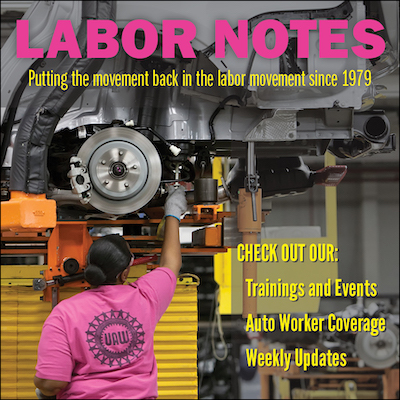So Ready to Strike

Auto Workers in Detroit gathered outside their union hall on September 10. Photo: Jim West, jimwestphoto.com.
Conventional wisdom tells us we would rather not strike if we can avoid it. Labor Notes’ Secrets of a Successful Organizer says to start small and build escalating campaigns of bigger and riskier actions. This is not the attitude, however, at Stellantis’s stamping plant in Sterling Heights, Michigan.
Over the past month, the strike is all anyone talks about. It’s been decades since Stellantis-predecessor Chrysler faced a major strike, so even those with high seniority are excited about their first opportunity to go out. The majority opinion is clear: “We are going to strike, and we are going to win.”
Workers count down the days until contract expiration, and anyone who complains about being scheduled for 14 or 21 days straight is reassured with a grin: “Don’t worry, we’ll have plenty of time off soon.”
This attitude might seem ideal. We workers understand our leverage in the economy and are ready to fight together and win! There are pitfalls, though.
Most of my co-workers are so confident in their power that they lack much interest in the contract campaign. To be sure, the new Auto Workers leaders are swimming upstream; the UAW has never attempted a contract campaign before at the Big 3. And leaders have had success getting workers strike-ready. Their open lines of communication and publication of demands have led to broad buy-in, excitement, and discussion.
Still, even those who are most excited to strike will forget to wear a red shirt on Wednesday, or balk at the idea of a rally or practice picket: “Why should I spend my energy on all of that? We are just going to win it with the strike!”
Similarly, everyone is convinced that come 11:59 pm on the 14th, we will be going on strike. The UAW’s strategy for the strike is a closely guarded secret. Possible approaches include everything from bottleneck strikes targeting a relatively small number of strategic plants, all the way up to striking every plant at all three employers. Our plant’s participation from day one is far from guaranteed, but you wouldn’t know it from the buzz on the shop floor.
For an energetic organizer, the potential of being in the factory after contract expiration is exciting. Unfettered by contract language against slowdowns or marches on the boss, there are huge opportunities for rank-and-file action. Unfortunately, the certainty regarding the strike makes many uninterested in these ideas.
These expectations have a downside. If midnight comes and goes and we are all still at work, many may feel let down, and may lose interest in collective action, or trust in the new leadership.
But “wanting to strike too much” is a good problem to have! When we know our position in the economy and our inborn antagonism with the boss, good things happen. It will take time to build a culture of rank-and-file activity, but we’ve already taken steps forward. A decisive strike can build on these successes.
E. Steele is the pen name of a Detroit-area auto worker.





